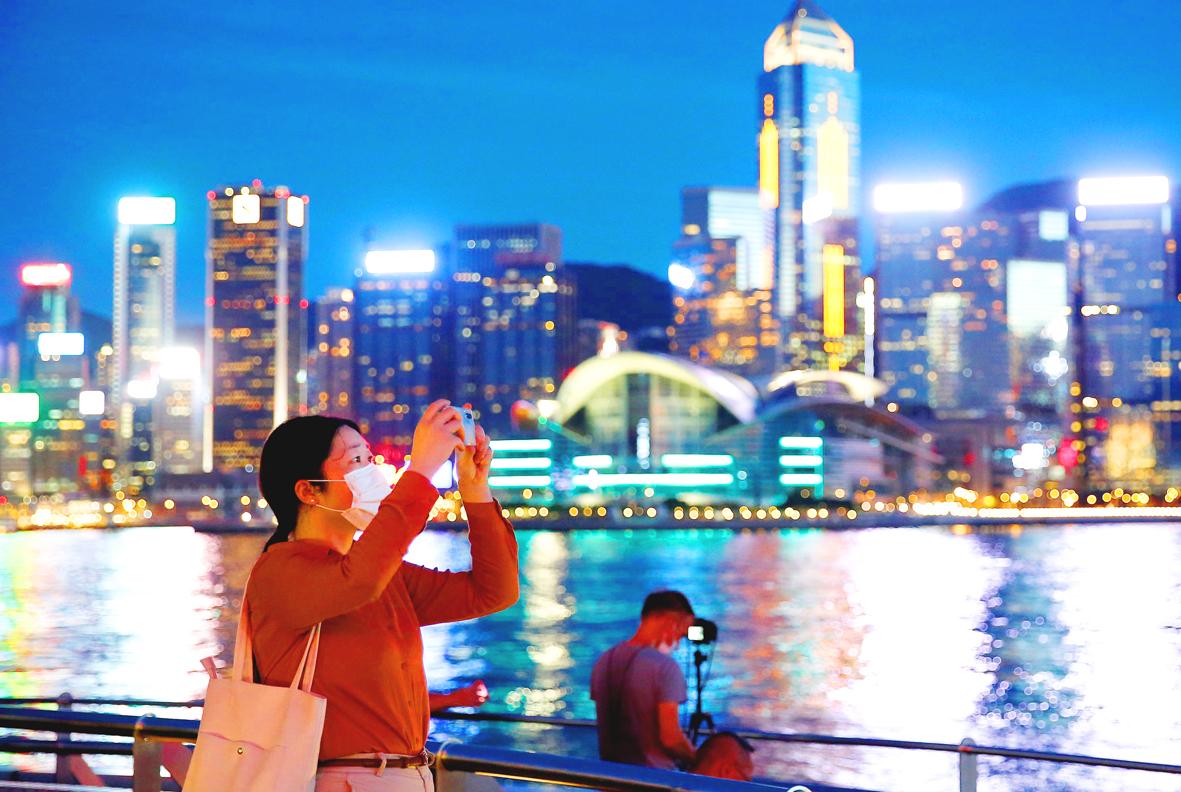The Hong Kong government is considering postponing upcoming Legislative Council (LegCo) elections amid a recent surge in coronavirus cases, media reports said, prompting criticism from pro-democracy candidates hoping to triumph in the September vote.
Hong Kong Chief Executive Carrie Lam’s (林鄭月娥) Executive Council was expected to meet yesterday to discuss the proposal, the Hong Kong Economic Times (HKET) reported, citing people it did not identify.
The government could declare a delay early next month, according to the HKET and separate reports by the Hong Kong Economic Journal and news organization HK01, which cited sources.

Photo: Reuters
A government announcement was meant to come after the nomination period ends on Friday, but the timing was uncertain after the information leaked to news outlets yesterday, the reports said.
“Increasingly it’s looking challenging to hold the election,” Executive Council convener Bernard Chan (陳智思), a top Lam adviser, said in an interview on Monday. “It’s not like September is going to be any better. I just can’t imagine things will be better and not worse than now, so we have to prepare for the worst.”
Calls for delaying the elections have been growing in recent days, with COVID-19 control measures making traditional campaigning increasingly difficult.
“Our bottom line is that we want to hold a safe election, an orderly, fair and just election, but the virus is really an important factor that we cannot neglect,” Hong Kong Chief Secretary Matthew Cheung (張建宗) said in response to a question at a Monday briefing. “We will closely monitor the situation and consider all factors. We will make announcements at an appropriate time.”
A postponement of the election, even for public health reasons, could prompt further criticism of the government or more protests.
Pro-democracy Legislator Eddie Chu (朱凱迪) tweeted that China wanted the delay in order to “avoid a potential devastating defeat” and because it was worried about further US sanctions should prominent opposition candidates be disqualified.
A delay would also pose legal challenges. By law, the chief executive is allowed to delay the election — for reasons such as typhoons, riots or public health emergencies — but a new date must be chosen for within two weeks of the original date.
BENNY TAI SACKED
In other developments, the University of Hong Kong yesterday sacked veteran democracy advocate Benny Tai (戴耀廷) from his tenured position as an associate professor of law, in a move he called “the end of academic freedom” in the territory.
Tai was a leading figure in the 2014 “Umbrella movement.”
He was sentenced to 16 months in prison last year for two public nuisance offences, but released on bail pending an appeal — a conviction which prompted school to begin reviewing his position more than half a year ago.
“It marks the end of academic freedom in Hong Kong,” Tai said on Facebook of the decision by the school’s governing council, which reversed an earlier decision by the university senate that there were not enough grounds for a dismissal. “Academic institutions in Hong Kong cannot protect their members from internal and outside interferences.”

CHAOS: Iranians took to the streets playing celebratory music after reports of Khamenei’s death on Saturday, while mourners also gathered in Tehran yesterday Iranian Supreme Leader Ayatollah Ali Khamenei was killed in a major attack on Iran launched by Israel and the US, throwing the future of the Islamic republic into doubt and raising the risk of regional instability. Iranian state television and the state-run IRNA news agency announced the 86-year-old’s death early yesterday. US President Donald Trump said it gave Iranians their “greatest chance” to “take back” their country. The announcements came after a joint US and Israeli aerial bombardment that targeted Iranian military and governmental sites. Trump said the “heavy and pinpoint bombing” would continue through the week or as long

TRUST: The KMT said it respected the US’ timing and considerations, and hoped it would continue to honor its commitments to helping Taiwan bolster its defenses and deterrence US President Donald Trump is delaying a multibillion-dollar arms sale to Taiwan to ensure his visit to Beijing is successful, a New York Times report said. The weapons sales package has stalled in the US Department of State, the report said, citing US officials it did not identify. The White House has told agencies not to push forward ahead of Trump’s meeting with Chinese President Xi Jinping (習近平), it said. The two last month held a phone call to discuss trade and geopolitical flashpoints ahead of the summit. Xi raised the Taiwan issue and urged the US to handle arms sales to

BIG SPENDERS: Foreign investors bought the most Taiwan equities since 2005, signaling confidence that an AI boom would continue to benefit chipmakers Taiwan Semiconductor Manufacturing Co’s (TSMC, 台積電) market capitalization swelled to US$2 trillion for the first time following a 4.25 percent rally in its American depositary receipts (ADR) overnight, putting the world’s biggest contract chipmaker sixth on the list of the world’s biggest companies by market capitalization, just behind Amazon.com Inc. The site CompaniesMarketcap.com ranked TSMC ahead of Saudi Aramco and Meta Platforms Inc. The Taiwanese company’s ADRs on Tuesday surged to US$385.75 on the New York Stock Exchange, as strong demand for artificial intelligence (AI) applications led to chip supply constraints and boost revenue growth to record-breaking levels. Each TSMC ADR represents

State-run CPC Corp, Taiwan (CPC, 台灣中油) yesterday said that it had confirmed on Saturday night with its liquefied natural gas (LNG) and crude oil suppliers that shipments are proceeding as scheduled and that domestic supplies remain unaffected. The CPC yesterday announced the gasoline and diesel prices will rise by NT$0.2 and NT$0.4 per liter, respectively, starting Monday, citing Middle East tensions and blizzards in the eastern United States. CPC also iterated it has been reducing the proportion of crude oil imports from the Middle East and diversifying its supply sources in the past few years in response to geopolitical risks, expanding